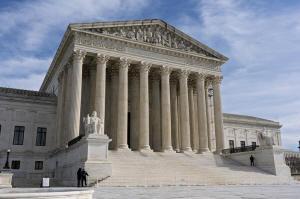Supreme Court will hear Texas anti-pornography law that challengers say
violates free-speech rights
 Send a link to a friend
Send a link to a friend
 [January 15, 2025]
By LINDSAY WHITEHURST [January 15, 2025]
By LINDSAY WHITEHURST
WASHINGTON (AP) — A Texas anti-pornography law is going before the
Supreme Court on Wednesday in a collision of free speech rights,
regulation of online content and the protection of children.
Texas is among more than a dozen states with similar laws aimed at
blocking young children and teenagers from viewing pornography. The
adult-content site Pornhub has stopped operating altogether in several
of those states, citing the technical and privacy hurdles in complying
with the laws.
Texas says its measure is necessary to protect children from the current
near-instantaneous access to porn, including hardcore obscene material,
on smartphones. “Texas seeks to protect kids from some of the most
prurient sexual content imaginable,” state attorneys wrote in court
documents.
The Free Speech Coalition, an adult-entertainment industry trade group,
says the Texas law wrongly affects adults by requiring them to submit
personal identifying information online, making it vulnerable to hacking
or tracking.

The group agrees that children shouldn't be seeing pornography, but it
argues the new law is so broadly written it could also apply to sexual
education content or simulated sex scenes in movies. The law also leaves
a loophole by focusing on porn sites rather than the search engines
often used to find porn, the group says in court documents.
“This really is about how the government can regulate any speech that it
doesn’t like,” Vera Eidelman, a staff attorney with the ACLU’s Speech,
Privacy, and Technology Project, told reporters last week. “Pornography
is often the canary in the coal mine for free speech.”
[to top of second column]
|

The Supreme Court is seen on Capitol Hill in Washington, Dec. 17,
2024. (AP Photo/J. Scott Applewhite, File)

This isn't the first time the Supreme Court has confronted the
issue. In 1996, the court struck down parts of a law banning
explicit material viewable by kids online. In 2004, a divided
Supreme Court ruled against a different federal law aimed at
stopping kids from being exposed to pornography but said less
restrictive measures like content filtering are constitutional.
Texas argues that technology has improved significantly in the last
20 years, allowing online platforms to quickly and easily check
users' ages with a quick picture, making it more like ID checks at
traditional stores that were upheld by the Supreme Court in the
1960s.
The states won in the 5th Circuit Court of Appeals, where a divided
panel overturned a lower court and allowed the age verification
requirement to go into effect. The Supreme Court previously refused
an emergency appeal asking to put the age verification on hold while
the legal fight continues.
Other states with similar laws include Tennessee, Arkansas, Indiana,
Kansas, Louisiana, Mississippi, Montana, Oklahoma, Utah and
Virginia.
The Texas law carries fines of up to $10,000 per violation that
could be raised to up to $250,000 per violation by a minor.
___
Associated Press writer Jonathan Mattise in Nashville, Tennessee,
contributed to this report.
All contents © copyright 2025 Associated Press. All rights reserved |